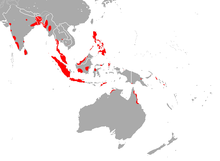- Naked-rumped Pouched Bat
-
Naked-rumped Pouched Bat Conservation status Scientific classification Kingdom: Animalia Phylum: Chordata Class: Mammalia Order: Chiroptera Family: Emballonuridae Genus: Saccolaimus Species: S. saccolaimus Binomial name Saccolaimus saccolaimus
Temminck, 1838
Naked-rumped Pouched Bat range The Naked-rumped Pouched Bat (Saccolaimus saccolaimus) is a species of sac-winged bat in the family Emballonuridae. It is found in Australia, Bangladesh, India, Indonesia, Malaysia, Papua New Guinea, the Philippines, Solomon Islands, Sri Lanka, Thailand, and possibly Myanmar.
Contents
Description
S. saccolaimus or T. saccolaimus (Payne et al., 1985) have dark-reddish brown or blackish brown upperparts which are irregularly marked with white patches.[1][2] Their underparts are usually white, but in one colour phase it can be dark brown.[3][4] They have no wing pouch or in other words, a poorly developed radio-metacarpal pouch.[5] They have a distinct glandular pouch on the throat.[6][7] The ear is short and broadly rounded with ribbing on the interior of the pinna with a short tragus which has a semicircular margin.[8] It has long and narrow wings with black skin and translucent whitish portions.[9] It is the largest species with the whitest wings.[10]
Distribution
India and Sri Lanka through SE Asia to Borneo, Sumatra, Java and Timor (Indonesia); New Guinea; NE Queensland (Australia); Guadalcanal Isl (Solomon Isls).[11]
Biology and Ecology
This medium sized bat roosts in hollow trees and rock crevices and sometimes houses in colonies varying from a few individuals to a few hundred.[12] Roosting bats maintain individual spacing. They are alert at the roost and scurry all over the roost substrate if disturbed.[13] Echolocation clicks produced by this bat in flight are audible. females give birth to a single young per litter.[14]
References
- ^ Bonaccorso, F.J. (1998). Bats of Papua New Guinea. Washington, D.C.: Conservation International. pp. 243-245.
- ^ Payne, J. & Francis, C.M. (1985). A Field Guide to the Mammals of Borneo. Sabah Society: Malaysia. p. 183.
- ^ Bonaccorso, F.J. (1998). Bats of Papua New Guinea. Washington, D.C.: Conservation International. pp. 243-245.
- ^ Payne, J. & Francis, C.M. (1985). A Field Guide to the Mammals of Borneo. Sabah Society: Malaysia. p. 183.
- ^ Bonaccorso, F.J. (1998). Bats of Papua New Guinea. Washington, D.C.: Conservation International. pp. 243-245.
- ^ Bonaccorso, F.J. (1998). Bats of Papua New Guinea. Washington, D.C.: Conservation International. pp. 243-245.
- ^ Payne, J. & Francis, C.M. (1985). A Field Guide to the Mammals of Borneo. Sabah Society: Malaysia. p. 183.
- ^ Bonaccorso, F.J. (1998). Bats of Papua New Guinea. Washington, D.C.: Conservation International. pp. 243-245.
- ^ Bonaccorso, F.J. (1998). Bats of Papua New Guinea. Washington, D.C.: Conservation International. pp. 243-245.
- ^ Payne, J. & Francis, C.M. (1985). A Field Guide to the Mammals of Borneo. Sabah Society: Malaysia. p. 183.
- ^ Wilson, D. E. & Reeder, D. M. (1993). Mammals Species of the World: A Taxonomic and Geographic Reference, Second Edition. Smithsonian Institution Press: Washington and London. p. 159.
- ^ Payne, J. & Francis, C.M. (1985). A Field Guide to the Mammals of Borneo. Sabah Society: Malaysia. p. 183.
- ^ Bonaccorso, F.J. (1998). Bats of Papua New Guinea. Washington, D.C.: Conservation International. pp. 243-245.
- ^ Bonaccorso, F.J. (1998). Bats of Papua New Guinea. Washington, D.C.: Conservation International. pp. 243-245.
- Chiroptera Specialist Group 1996. Saccolaimus saccolaimus. 2006 IUCN Red List of Threatened Species. Downloaded on 10 July 2007.
Murphy S. (2002) Observations of the 'Critically Endangered' bare-rumped sheathtail bat Saccolaimus saccolaimus Temminck (Chiroptera: Emballonuridae) on Cape York Peninsula, Queensland. Australian Mammalogy 23: 185-187.
Categories:- IUCN Red List least concern species
- Mammals of Bangladesh
- Mammals of India
- Mammals of Sri Lanka
- Bats of Australia
- Mammals of the Northern Territory
- Emballonuridae
Wikimedia Foundation. 2010.

